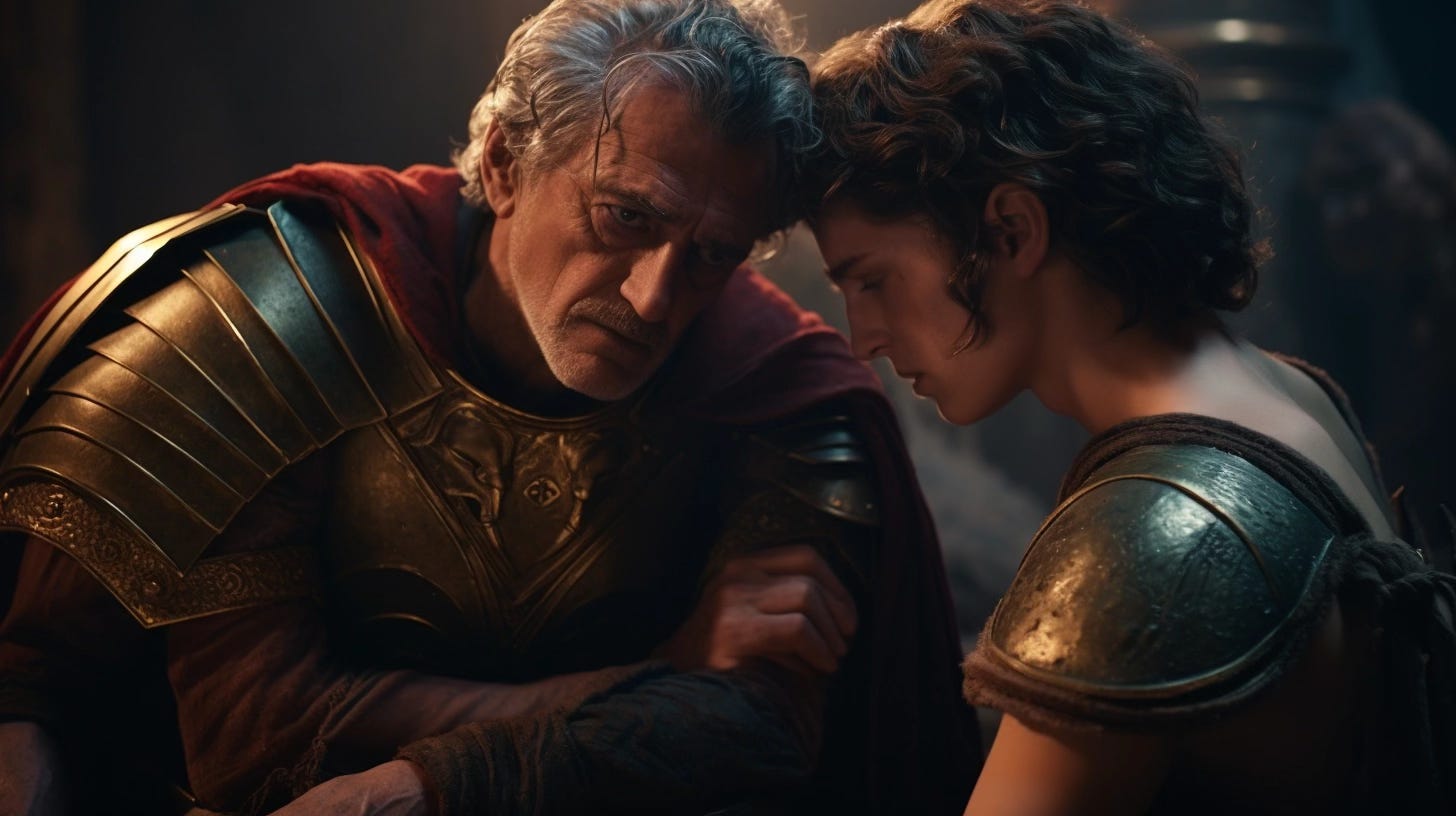The Iliad: Reflections on Books 21 – 24
Homer beautifully weaves the two threads from paragraph 1––Zeus’ will and Achilles’ wrath––into a wondrous conclusion.
Who directs the course of action in The Iliad?
There is a startling resolution to this question in the final books of this epic. Homer beautifully weaves the two threads from paragraph 1––Zeus’ will and Achilles’ wrath––into a wondrous conclusion. The Iliad, a small portion of the overall Trojan War, with key pieces absent from the narrative, concludes in a masterful stroke.
From the beginning of the epic, Achilles’ cataclysmic wrath against Agamemnon causes the death of countless Greeks. During the previous nine years of battles, Achilles’ believes he has done the bulk of the fighting and yet Agamemnon is receiving the glory. This is especially grating to Achilles because his mother Thetis has revealed a prophecy that he will gain glory in battle but die young.
To make matters worse, Agamemnon has stolen Achilles’ favorite girl, Briseis. Something is not right. Achilles has been promised glory and at this point in the narrative, that is the very thing he lacks. This is why Agamemnon’s promised gifts don’t appease Achilles. He can’t enjoy gifts if he is to die soon. He expects glory and it is nowhere to be found. Is the prophecy wrong?
The wrath of Achilles against Agamemnon shifts when Patroclus is killed. Achilles goes into tremendous grief. Agamemnon and Achilles agree to bury the hatchet, but grief does not assuage the wrath, and it merely shifts to Hector and the Trojan army. Achilles goes on a killing rampage, damning a river with bodies. There is no mercy, even when Priam’s son begs for it. Where Achilles’ wrath first cost the lives of Greeks, it is now consuming the lives of Trojans at an astonishing rate.
Achilles eventually kills Hector, launching Priam and the Trojans into deep mourning. Zeus, through Iris, then orders Priam to ransom the body of Hector, who is being mutilated and dishonored by Achilles. Zeus tells him to go alone and to take gifts, a plan that seems like a suicide mission.
At this point in the narrative, the reader should be questioning Zeus’ order to Priam on three main levels. First, wrathful Achilles would have the king of the Trojans in his ship alone to easily kill. Second, if hoping for mercy, Book 21 shows that even when another of Priam’s sons, Lycaon, begs Achilles for his life, mercy is nowhere to be found. Mercy and wrath are incompatible. Third, if Priam hopes to soften Achilles’ heart with the gifts he brings, not even Agamemnon’s enormous gift list could sway him.
What is Zeus thinking? Is this how the plan of Zeus will unfold?
Yes, it is. But in an unexpected way. Zeus knows Achilles at a deeper level. Through Iris, Zeus says:
“Achilles will not kill you––he’ll hold back all the rest: Achilles is no madman, no reckless fool, not the one to defy the gods’ commands. Whoever begs his mercy he will spare with all the kindness in his heart!”
All evidence would indicate otherwise. But Zeus sees beyond the wrath of Achilles despite the variations it has taken throughout the epic. On one level, Zeus could use the wrath of Achilles to his ends. But on a deeper level, Zeus could see past the wrath into how Achilles would treat the actual king of Troy amidst shared grief.
Achilles welcomes him in and they have one of the most memorable scenes in the epic. They weep together. Priam kisses the hand that killed his son. There is a potential end of the hostilities, a truly epic moment that offers the reader, and in extension humankind, a way out of war through the deep human connection made possible through shared grief.
So who directs the course of action in The Iliad? It’s not clear during the epic. At times, it seems like Achilles’ wrath determines the course. It surely doesn’t seem like the will of Zeus is the main driver amidst immortal infighting, deified deceit, and the machinations of mortals. How could Zeus direct all of this into a cohesive plan?
He could through knowledge of the deeper man and what they would do in a given circumstance, even to the surprise of the man involved. The expectation is that the rage of Achilles would kill Priam and perhaps even end the war with the King dead. The reality is that the unexpected kindness amidst grief would rule that day and offer a brief respite from war. Zeus knew that, even if Priam, Achilles, and others didn’t. And he was able to weave his will and direct the course of action through that knowledge.
The Iliad ends there. The Trojan war didn’t. Hostilities resumed, women were raped, children killed, and a civilization destroyed. By ending the epic where he did, Homer invites the contemplation of a way out of war even amidst one of the greatest war stories ever told. It’s a masterpiece as relevant today as at any other point in human history.




